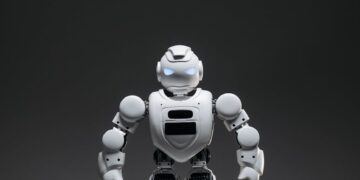The landscape of artificial intelligence is undergoing a profound metamorphosis. What began as simple, task-oriented tools – think basic automation scripts or rudimentary chatbots – is rapidly evolving into a realm of proactive, intelligent agents. These aren’t merely reactive programs; they are systems capable of anticipating needs, making autonomous decisions, and even learning from complex interactions. This seismic shift moves AI beyond being just a utility to becoming a genuine collaborator, fundamentally reshaping the very fabric of our daily workflows and personal lives. This article will delve into how this evolution will redefine efficiency, creativity, and the human experience, exploring the deep implications for both professional environments and individual existence.
The paradigm shift: from tools to intelligent partners
For years, AI has largely functioned as an extension of human commands, executing predefined tasks or offering data insights upon request. We’ve become accustomed to AI as a powerful calculator, a sophisticated search engine, or a pattern recognition system. However, the current trajectory points towards AI graduating from mere instrumentation to genuine partnership. This transformation involves AI agents that possess a growing degree of autonomy, contextual understanding, and predictive capabilities. Instead of waiting for instructions, these agents will initiate actions, offer solutions before problems arise, and integrate seamlessly into our routines, learning from our habits and preferences. This isn’t just about faster execution; it’s about a cognitive leap where AI transitions from following orders to anticipating intentions, fundamentally altering the human-machine dynamic.
Redefining professional workflows
The integration of proactive AI agents into professional settings promises to revolutionize productivity and innovation. These agents will move beyond simple data entry or report generation, undertaking complex, multi-faceted tasks that previously required significant human oversight. Consider the shift in various sectors:
- Automated decision-making: In supply chain management, AI agents could dynamically reroute shipments based on real-time traffic, weather, or geopolitical events, without human intervention. In finance, they might execute trades based on predictive market analysis, far faster than human analysts.
- Enhanced creativity and problem-solving: AI won’t just analyze data; it will synthesize disparate information, identify novel correlations, and even propose innovative solutions to complex problems, acting as a tireless brainstorming partner for R&D teams or a predictive assistant for strategic planning.
- Personalized skill development: AI agents could monitor individual performance, identify skill gaps, and curate personalized learning modules, ensuring continuous professional growth tailored to each employee’s needs and career trajectory.
Here’s a comparison of current automation versus future proactive AI in a professional context:
| Task Area | Current Automation / Simple AI | Proactive AI Agent |
|---|---|---|
| Email Management | Filters spam, sorts emails by sender/topic. | Drafts replies, prioritizes urgent communications, schedules meetings based on content, flags pending actions, anticipates follow-ups. |
| Project Management | Tracks deadlines, assigns tasks, generates basic reports. | Identifies potential bottlenecks, reallocates resources proactively, optimizes timelines, anticipates team conflicts, suggests alternative strategies. |
| Data Analysis | Generates reports based on predefined queries, identifies trends. | Discovers hidden correlations, formulates hypotheses, recommends strategic actions, predicts market shifts, presents insights in natural language. |
Personal lives transformed: hyper-personalization and smart living
Beyond the workplace, proactive AI agents will permeate and profoundly reshape our personal lives, leading to an unprecedented level of hyper-personalization and seamless smart living. Imagine a home environment that not only responds to commands but anticipates your needs: adjusting lighting based on your mood, pre-heating the oven as you leave work, or even ordering groceries when supplies are low, all learned from your routines and preferences. In healthcare, AI agents could move from simple fitness tracking to continuous, proactive health monitoring, predicting potential issues based on biometric data, lifestyle, and genetic predispositions, and then recommending preventative measures or scheduling specialist consultations automatically. Education will become deeply individualized, with AI tutors adapting curricula in real-time to each student’s learning style and pace, offering personalized challenges and support. Even leisure activities will be transformed, with AI agents curating personalized travel itineraries, recommending entertainment based on subtle shifts in taste, or connecting individuals with like-minded communities, all without explicit prompting. This shift moves us from merely interacting with smart devices to living within an intelligent ecosystem that continuously optimizes for our well-being and desires.
Navigating the ethical and societal implications
While the potential benefits of proactive AI agents are immense, their rapid evolution also ushers in a complex array of ethical and societal challenges that demand careful consideration. The profound level of data collection required for these agents to learn and anticipate our needs raises significant privacy and security concerns; ensuring this data is handled responsibly and securely will be paramount. Questions of autonomy and control will become increasingly pertinent: to what extent do we delegate decision-making to AI, and how do we maintain human oversight, especially in critical areas? The economic impact, particularly concerning job displacement versus job creation, will require adaptive policies and educational reforms to ensure a just transition. Furthermore, the risk of AI agents perpetuating or amplifying existing societal biases, especially if trained on unrepresentative datasets, necessitates rigorous ethical guidelines and continuous auditing. Finally, ensuring equitable access to these advanced technologies, preventing a widening digital divide, will be crucial for a future where the benefits of proactive AI are shared broadly across society.
Conclusion
The journey of AI from rudimentary tools to sophisticated, proactive intelligent agents marks a pivotal moment in human history. This evolution is not merely an incremental improvement; it represents a fundamental reshaping of how we interact with technology, our work, and our personal environments. We stand on the cusp of an era where AI will anticipate our needs, enhance our creativity, optimize our daily routines, and profoundly personalize our experiences, driving unprecedented levels of efficiency and convenience. While this transformation promises incredible advancements, it also brings forth critical considerations regarding data privacy, job market shifts, and ethical governance. The successful integration of these intelligent agents into our lives will hinge on our ability to navigate these complexities thoughtfully, ensuring that AI serves humanity’s best interests. By fostering responsible development and equitable access, we can harness the full potential of proactive AI, leading to a future where human ingenuity and artificial intelligence synergistically create a more productive, personalized, and enriched existence for all.



















